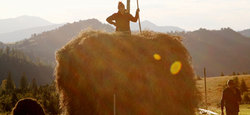Romania: A fertile land of opportunity
Attracted by the low cost of agricultural land, Farmers from elsewhere in the EU are taking the plunge to set up in Romania. In so doing they are contributing to a renewal of local agriculture which is increasingly oriented towards organic produce.
At age 19, Maxime Laurent graduated from the agricultural high school in Nermont Châteaudun (Eure-et-Loir) in 2009. A month later, he helped load a convoy of trucks with farming of equipment, before setting out for a new life in Romania, or more precisely Macesu de Sus, a village in the southwest of the country.
Maxime Laurent’s story is far from unusual: Romania with its 15 million hectares of arable land is in the process of becoming a new El Dorado for Europe’s farmers. Thousands of French, Italian, Spanish, British, German, and Danish farmers are packing their bags and rushing to set up in the country which joined the European Union in 2007.
For Maxime, who has always wanted to work on the land, it is a dream come true. "At age 19, I was in charge of a farm of more than 1,400 hectares. To achieve what I achieved in Romania in just three years would have taken two or three generations in France."
In Macesu de Sus, he cultivates wheat, barley, sunflowers and rapeseed. Now he is counting on European Commission funds for the modernisation of Romanian agriculture to complete an ambitious project that will increase his silo capacity by 7,000 tonnes and enable him to irrigate an additional 500 hectares.
In spite of the difficulties, he has no regrets. "The first few months were a bit overwhelming,” he remarks. “But if I had stayed in France, what would I be doing? I’d have finished my studies, and I’d be working for 1,200 euros a month. You pay the rent, you eat, you buy a few clothes, and at the end of the month you have nothing left. That’s not living!"
Agriculture grew by 11%
Nowadays, you cannot travel across Romania without meeting farmers newly arrived from western Europe who are re-inventing the country’s agriculture. Thanks to their know-how and investment, Romanian agriculture grew by 11% in 2011, and this is only the beginning. Land left to run wild and the sense of abandon that used to be a feature of the Romanian countryside are disappearing fast.
The going rate for arable land in Romania is around 2,000 euros per hectare, an extraordinarily low price for the EU. EU subsidies per hectare amount to 180 euro, which is half of the current rate in Western Europe. However, from 2014, the new Common Agricultural Policy (CAP) is expected to put Western and Eastern Europe on an equal footing.
As it stands, farmers from other EU states who wish to buy land in Romania are obliged to register companies in the country. However, from 2014, EU residents will be allowed to acquire land directly. And this is the main reason for the current rush to buy in the country before speculation sends prices skyrocketing.
Among the most hurried are Swiss farmers who no longer have the means to pay the tens of the thousands of euros per hectare demanded for land in their home country. Ten years ago, three generations of the Hani family – the father, the mother, two children and two grandchildren – pulled up stakes in the canton of Lucerne to move to Firiteaz, a small village situated in western Romania, where they have now acquired 800 hectares of land.
"In Western Europe, there are no opportunities for young people,” complains Christian Hani, age 29. “Here you can build something from nothing. I think it is very important for our generation to create something new."
To once again be Europe's granary
The organic food market is booming in Western Europe, and the Hanis are constantly running out of stock. When they came from Switzerland, they brought all of the equipment they need for large scale organic agriculture.
"Until now, the cereals we produce here were imported from Canada, the United States and China,” explains Lukas Kelterborn, a German marketing specialist who works with the Hanis. “So it is perfectly normal to want to grow them in Europe. The prospects in Romania are extraordinary. We should not forget that between the wars, the region was Europe’s granary and it’s poised to take on this role again."
In Macesu de Sus, Maxime is similarly enthusiastic. He and his Romanian wife are planning to build a house on his land. He already has a house in the local village and an apartment in the nearby town of Craiova.
"In Romania, life is a lot more flexible, and it also offers you a chance to discover traditions that we no longer have in France,” he says. “I have never butchered a pig or a sheep in my life, but the Romanians who live in the country still do that... In France, people no longer have any ties with anyone. I am very happy here." You can take a farmer’s word for it.













